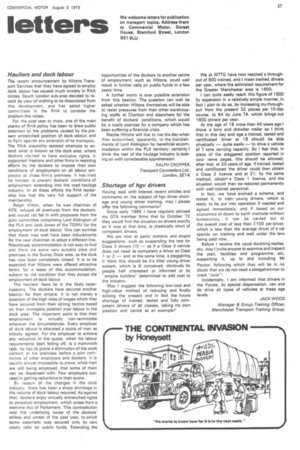Hauliers and dock labour
Page 29

If you've noticed an error in this article please click here to report it so we can fix it.
The recent announcement by Hiltons Transport Services that they have agreed to employ dock labour has caused much anxiety in RHA circles. South London sub-area decided to record its view of wishing to be dissociated from this development, and has asked higher committees in the RHA to consider the problem this raises.
For the past year or more, one of the main planks of RHA policy has been to draw public attention to the problems caused by the present entrenched position of dock labour, and to fight against any extension of its monopoly. The RHA staunchly resisted attempts to extend what is known as the dock area, where dockers claimed to have exclusive rights. It supported Heatons and other firms in resisting efforts by the dockers to impose their own conditions of employment on all labour employed at those firm's premises. It has tried its hardest to prevent dockers' conditions of employment extending into the road haulage industry. In all these efforts the RHA leadership has had the very full support of the membership.
Ralph Hilton, when he was chairman of HTS, refused all overtures from the dockers, and would not fall in with proposals from the joint committee comprising Lord Aldington of the PLA and Jack Jones of the TGWU for the employment of dock labour. One can surmise that there may well have been inducements for the new chairman to adopt a different line. Warehouse accommodation is not easy to find and there are some very suitable sites and premises in the Surrey Dock area, as the dock has now been completely closed. It is to be expected that Hiltons were offered attractive terms for a lease of this accommodation, subject to the condition that they accept the employment of dock labour.
The hauliers' fears lie in the likely repercussions. The dockers have secured another bastion for their empire. It is not merely a question of the high rates of wages which they have secured from their strong tactics based on their monopoly position over labour in the dock area. The important point is that their employment is virtually non-terminable whatever the circumstances. Every employer of dock labour is allocated a quota of men as initially agreed. For the employer to achieve any reduction in the quota, when his labour requirements start falling off, is a mammoth task; he has to prove a diminution of the work content at his premises before a joint committee of other employers and dockers. It is usually almost impossible to prove, while men are still being employed, that some of them can be dispensed with. Few employers succeed in getting reductions in their quota..
By reason of the changes in the dock industry, there has been a sharp shrinkage in the volume of dock labour required. As against that. dockers enjoy virtually entrenched rights to perpetual employment, which arises from a wartime Act of Parliament. This contradiction was the underlying cause of the dockers' strikes and unrest of the past year, to which some easement was secured only by very costly calls on public funds. Extending the
opportunities of the dockers to another centre of employment, such as Hiltons. could well result in further calls on public funds in a few years' time.
A further worry is over possible extension from this bastion, The question can well be asked whether Hiltons themselves will be able to resist pressures from their other warehousing staffs at Charlton and elsewhere for the benefit of dockers' conditions, which would be a costly exercise for a company which has been suffering a financial crisis.
Maybe Hiltons will live to rue the day when they succumbed, apparently, to the blandishments of Lord Aldington for beneficial accommodation within the PLA territory; certainly I think the rest of the haulage industry is looking on with considerable apprehension.
RALPH CROPPER, Transport Counsellors Ltd., London, S£14.
































































































